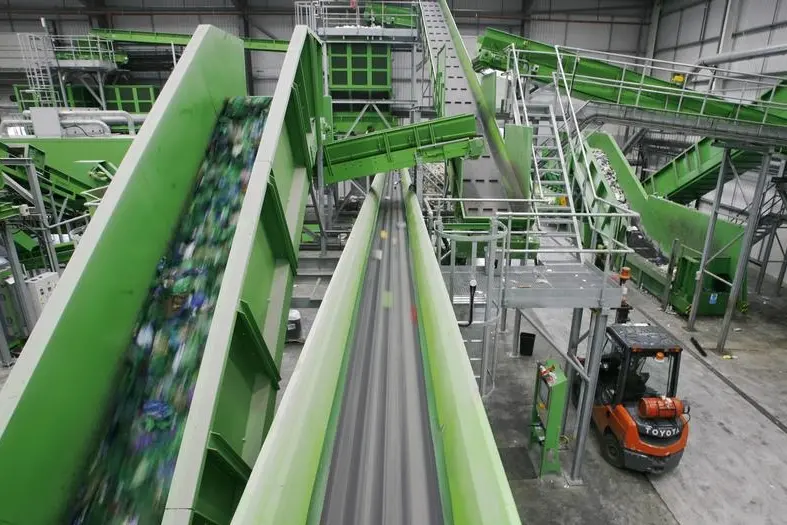PHOTO
Dubai Industrial Park today officially inaugurated the world’s largest integrated electric and electronic waste (e-waste) recycling facility ‘The Recycling Hub’ by Enviroserve.
The special launch event was held under the patronage of Sheikh Nahyan Mabarak Al Nahyan, Minister of Tolerance. It was attended by senior government officials, industry leaders and business partners.
Stuart Fleming, group CEO of Enviroserve, welcomed the distinguished guests and visitors.
The guests toured the state-of-the-art 280,000-sq-ft e-waste recycling plant, which processes WEEE (waste electrical and electronic equipment), IT asset disposition (ITAD), refrigerant gas, and specialised waste.
The facility, which features the latest Swiss technology that surpasses strict EU standards for e-waste recycling, will accept all types of end-of-life electric and electronic equipment.
The recycling hub has a processing capacity of 100,000 tonnes of total integrated waste per year, of which 39,000 tonnes is e-waste. The facility can process the entire range of WEEE from consumer and industrial to commercial and military. These include air conditioners, batteries, computers, household appliances, mobile phones, and even military avionics, to name a few. The integrated facility will also recycle specialised waste material such as aerosol cans, light bulbs, and FMCG products, and is currently the only dedicated refrigerant gas reclaim facility in the UAE.
The recycling facility’s mechanical separation process is chemical-free with industrial air filtration, allowing for a 96% recovery rate with zero air and liquid emissions. To put things into perspective, this means 38,000,000 kg of e-waste will be kept out of landfills each year.
During the event, Saud Abu Al-Shawareb, managing director at Dubai Industrial Park, said: “The launch of the Recycling Hub at Dubai Industrial Park is a reflection of the UAE’s journey towards becoming a global platform that attracts innovative businesses and a successful model of the new green economy. We take pride in our partnership with Enviroserve, a key milestone in our mission to contribute to the development of an advanced industrial sector in the UAE that is focused on innovation and sustainable technology, and we look forward to the far-reaching positive impact that will extend to several regions in the world right from the heart of Dubai.”
The Dh120-million ($32.67 million) project is backed by the Swiss Government Export Finance Agency and represents one of the largest foreign direct investments in the field of environmental management to date in the UAE. The project will service international e-waste recycling efforts across Africa, the Middle East and the Caucasus.
The Recycling Hub is set to benefit from Dubai’s strategic location, progressive policies, as well as the emirate’s intelligent infrastructure.
Fleming said: “We are happy to launch our new e-waste recycling facility today and to be part of Dubai Industrial Park whose support was invaluable to us to turn this vision into a reality. Utilising innovative green technology in this iconic facility, we are confident this will be a true game-changer in electronic and specialised waste recycling for the UAE and the wider Middle East, Africa and Caucasus region. The Recycling Hub is the outcome of Enviroserve’s pioneering 15-year journey in the e-waste industry and we look forward to elevating the sustainability movement in the region.”
A centre of expertise for electronic waste management in the region, Enviroserve has already begun processing electronic waste for its partner Epson. During The Recycling Hub’s launch, Enviroserve announced its partnership with Nespresso to recycle all of the coffee giant’s aluminium capsules and machines in the UAE. Also during the launch event, the company announced a regional partnership with Lenovo to recycle and refurbish the latter’s electronic products.
The project comes at a time when every year, some 50 million tonnes of electronic and electrical waste is produced globally, of which only 20 per cent is formally recycled. According to a UN-sponsored project finding, the average UAE resident generates 17.2 kg of e-waste every year, most of which contain harmful toxins, such as arsenic, cadmium and mercury.
Copyright 2019 Al Hilal Publishing and Marketing Group Provided by SyndiGate Media Inc. (Syndigate.info).
Disclaimer: The content of this article is syndicated or provided to this website from an external third party provider. We are not responsible for, and do not control, such external websites, entities, applications or media publishers. The body of the text is provided on an “as is” and “as available” basis and has not been edited in any way. Neither we nor our affiliates guarantee the accuracy of or endorse the views or opinions expressed in this article. Read our full disclaimer policy here.





















